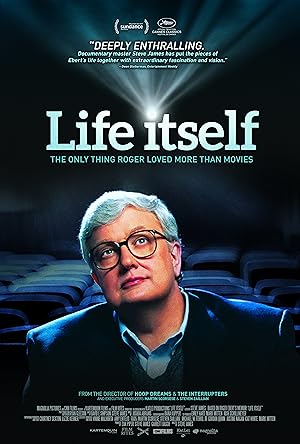
Life Itself Page #6
- Because it's too tough to take.
being on television
is that at his heart,
he really is a populist.
Roger believes that everybody
ought to be able to get a movie.
I think they were conscientious
about trying to
do what they were doing
as well as they could,
and as seriously as they could.
But invariably, a show
like Gene and Roger's show
becomes a part of
that mainstream system.
This week,
Siskel and Ebert review
Arnold Schwarzenegger
in Last Action Hero.
And by and large,
the purpose of mainstream reviewing
is not just to valorize films
that get multi-million dollar
ad campaigns.
... Jurassic Park.
But to eliminate everything else.
I think what Gene and Roger did
was the opposite of that.
Roger went out and he looked
for people like Michael Moore.
As a film critic,
he was somebody
who gave life to new voices,
gave life to new visions,
that reflected all the diversity
of this nation.
Different classes,
points of view,
he wanted it all out there.
My assurance to the pet owner
that they will be
reunited with their pet.
My first film, Gates of Heaven.
There was a newspaper strike.
And so the movie wasn't reviewed
by any of the New York newspapers,
which is a disaster.
I miss that little black kitten
so much.
I just thought, that's it,
the movie's just going to vanish.
Both of them wanted
to review it.
I was troubled
because the number of theaters
in which it was playing
was extremely small,
and here you have a show
that's being shown
on 300 some-odd public television
stations around the country.
How are people gonna get to see it?
Let's move on to a movie now
that I think is one of the most
brilliant, weird, and unusual
American documentary films
I've seen in a long time.
And then
really out of nowhere,
those guys started reviewing
Gates of Heaven.
Well, I agree with you completely.
Then they found an excuse
to review it again.
There are films that
we call "Buried Treasures."
And a third time.
I don't think anyone who's seen
this film can ever forget it.
really have a career
if not for those guys.
I made my first film.
I kind of made it alone.
I didn't know anyone
in the industry.
I don't even know
how I got Roger's email,
but I emailed, assuming
no one would answer.
And he answered. And he said,
"If your film gets into Sundance,"
tell me and I would
watch it there."
So then later,
the film did go to Sundance,
and I emailed him again,
and he said,
"Yes, I'll come to see it." I said,
"Here are the three times."
He didn't come
to the first screening,
he didn't come
to the second screening,
and the last screening
was a Sunday morning, I think,
8:
00 a.m., on the last dayof the festival.
I said he's
probably not even here.
In fact, he was one of
And I was there
with my actor, and he said,
"Do you mind
if I take some pictures
with you and your actor,
just in case I like the film?
If I don't like it, don't worry,
I'll never use them."
I was, I think, I was maybe
eight or nine or something,
and my Aunt Denise,
who was a massive film geek,
who passed
her film geekdom onto me,
found out about
these rehearsals for the Oscars,
and one day
he walked through.
And I remember saying,
"Thumbs up! Thumbs up!"
screaming, screaming,
and he came over.
I grew up.
I made this film
when I was 34 years old.
It was the first film
I ever made.
You're second generation.
Joshua Tree generation.
The film
was about my aunt,
my aunt who took me
to the Oscar's that day.
Nothing wrong with that.
And about
losing someone that you love.
And it was Ebert's review
that really got to the heart
of what I was trying
to articulate.
And just touched me so much,
that I sent him
the picture from the Oscar's.
His reply was,
"We were both younger then."
The next day,
a blog post turned up
where he wrote,
in a very heartfelt way,
about his own aunt
who kind of gave him the gift
of art and film as well.
You know, I broke down crying,
and it was a mess.
It's dangerous as a black woman
to give something that you've made
from your point of view,
very steeped in your identity
and your personhood
is usually the exact opposite,
and to say, you are the carrier
of this film to the public.
You're the one that's gonna
dictate whether it has value.
And you had a lot less fears
around that with Roger.
Because you knew it was someone
who was gonna take it seriously,
gonna come with
some historical context,
some cultural nuance.
I mean, everybody knows
Roger had a black wife.
You know what I mean?
You know.
He's like an honorary brother.
I mean, you live with a sister.
That's a whole different
understanding of black women, right?
So maybe you watch
my film differently.
Every time I see him, I'll walk away
with something new, you know.
And every time I sit down
at the table to do the work,
I think about him,
because what if something happens
and I don't get to see him again.
It was just a few days
before Christmas.
I said, "Well, Chaz,
can I come there?"
- So...
- Merry Christmas.
Come on over and say hi.
How are you?
Good to see you.
What are you doing in here?
Chaz is missing you at home,
you gotta get out.
Oh, I like the glasses.
Get off the road...
It was nice to see him
interacting with his grandkids.
Grandpa Roger, do you think...
I know that he must be
in pain physically,
but he ends up being
the happiest guy around.
- From the Christmas stocking.
- From Santa.
From Santa.
I just remember being so young,
and watching for the first time
so many movies
and him sort of explaining
to me, you know,
what's important about this one,
or this is a really great movie.
Ever heard of this film?
This movie begins
with seven children
who are seven,
and check in on them
every seven years
of their lives.
Are they 56 now? Really?
Oh, my gosh, wow.
All the great conversations
about movies and life
and family and books,
and you know,
all this stuff, I just...
Those experiences
mean a lot to me.
There's another
chocolate bar, chocolate bars.
So I spoke to Werner,
I said I was coming to see you,
and he sends his regards,
and he says
you have to keep writing
because he's very worried
about cinema.
Can you say it the way
Werner would say it?
Oh, gosh. No.
- Roger...
- Roger you must get better.
You must soldier on, Roger.
Really bad shape.
He's the soldier of cinema.
He's a wounded comrade
who cannot even speak anymore,
and he plows on,
and that touches my heart
very deeply.
I never dedicate films
to anyone.
I dedicated a film to him
where I ventured out
to the last corner
of this planet...
to Antarctica,
to the ice.
And from there I bow my head
in his direction.
He reinforces my courage.
Translation
Translate and read this script in other languages:
Select another language:
- - Select -
- 简体中文 (Chinese - Simplified)
- 繁體中文 (Chinese - Traditional)
- Español (Spanish)
- Esperanto (Esperanto)
- 日本語 (Japanese)
- Português (Portuguese)
- Deutsch (German)
- العربية (Arabic)
- Français (French)
- Русский (Russian)
- ಕನ್ನಡ (Kannada)
- 한국어 (Korean)
- עברית (Hebrew)
- Gaeilge (Irish)
- Українська (Ukrainian)
- اردو (Urdu)
- Magyar (Hungarian)
- मानक हिन्दी (Hindi)
- Indonesia (Indonesian)
- Italiano (Italian)
- தமிழ் (Tamil)
- Türkçe (Turkish)
- తెలుగు (Telugu)
- ภาษาไทย (Thai)
- Tiếng Việt (Vietnamese)
- Čeština (Czech)
- Polski (Polish)
- Bahasa Indonesia (Indonesian)
- Românește (Romanian)
- Nederlands (Dutch)
- Ελληνικά (Greek)
- Latinum (Latin)
- Svenska (Swedish)
- Dansk (Danish)
- Suomi (Finnish)
- فارسی (Persian)
- ייִדיש (Yiddish)
- հայերեն (Armenian)
- Norsk (Norwegian)
- English (English)
Citation
Use the citation below to add this screenplay to your bibliography:
Style:MLAChicagoAPA
"Life Itself" Scripts.com. STANDS4 LLC, 2025. Web. 4 Mar. 2025. <https://www.scripts.com/script/life_itself_12550>.







Discuss this script with the community:
Report Comment
We're doing our best to make sure our content is useful, accurate and safe.
If by any chance you spot an inappropriate comment while navigating through our website please use this form to let us know, and we'll take care of it shortly.
Attachment
You need to be logged in to favorite.
Log In